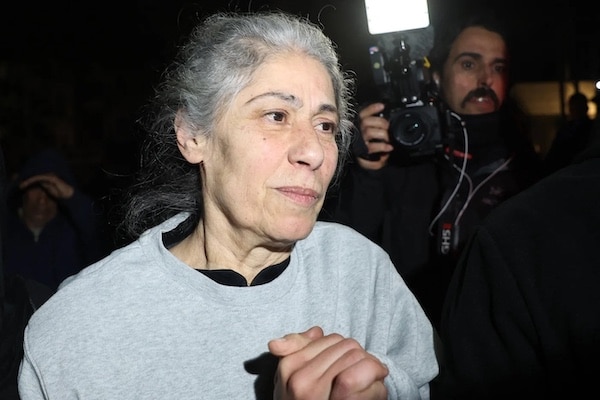The happiness and relief felt by Palestinians following the release of 90 prisoners from Israeli detention as part of the ceasefire deal to end fighting in Gaza has been tempered by concerns about the conditions they were kept in.
Palestinian prisoners were seen exhausted, malnourished and in some cases were left unrecognisable compared to their former selves before going into Israeli prisons.
Israeli authorities in the occupied West Bank released 90 prisoners, including women and children, in the first batch of releases following the ceasefire agreement.
Khalida Jarrar, a key figure in the leftist Popular Front for the Liberation of Palestine (PFLP), left prison with her hair turned white after months of solitary confinement.
The 61-year-old, an MP, feminist and prisoners’ rights advocate, had been held in administrative detention—a policy that allows Israeli authorities to hold individuals without charge or trial—since 26 December 2023.
In August she was moved to solitary confinement as a “form of punishment”, according to the Palestinian Prisoners Club, and held for six months in a one metre by 1.5 metre cell at Ayalon (Ramla) prison.
Palestinian political leader Khalida Jarrar has been released as part of the ceasefire agreement brokered between Israel and Hamas.
Jarrar has been held in administrative detention since December 2023 and reportedly spent the last six months in solitary confinement pic.twitter.com/Q5aDobaKNb
— Middle East Eye (@MiddleEastEye) January 20, 2025
According to Palestinian politician Hanan Ashrawi, all of the prisoners released on Monday had endured “severe ill treatment including verbal and physical violence, deprivation and isolation.”
“Israeli prisons are notorious for their abuse and torture of Palestinian prisoners. We rejoice at the release of our women and child captives, and look forward to the release of the remaining 11,000. Freedom is priceless,” she added in a post on X.
Ablaa Sadaat, who was held in Ofer prison under administrative detention, told Middle East Eye that the living conditions in Israeli prisons were “absolutely inhumane”.
“From the lack of food and medical care, to the treatment [of prisoners], it’s horrible. They try to break the prisoners’ sense of self, and make us feel like we’re less than them and that they are above us and have authority over us… They try to break our sense of self and our pride,” Sadaat said.
The former detainee, whose husband Ahmad Sadaat is still in Israeli detention, said this level of mistreatment has “never been seen during the entire history of [Palestine’s] occupation.”
Only one week into her imprisonment, Sadaat said she was taken for interrogation under the guise of a medical checkup, where she was later accused of threatening the security of the prison and Israel as a whole. She was then completely isolated for two weeks inside a two-by-two metre cell.
“They used to spray gas inside the prison cells before they shackled and blindfolded us, and make us kneel in the prison courts,” she said, adding that the abuse escalated following the Hamas-led attacks of 7 October.
“The moment of freedom is something I wish for all prisoners. Freedom is something that is invaluable, truly,” she said.
The Palestinian news outlet Arab48 reported that the days leading up to Monday were especially difficult for those released, noting that they were not aware they would be freed so soon.
Yasmine Abu Surur, one of the released detainees, said they were left completely isolated a week before the ceasefire agreement came into effect, with the prison administration rendering them cut off from the outside world.
“We have been without news for a week, and we do not know what is happening outside. Until Sunday morning, we were not sure that this was the day of freedom,” she said.
Abuse and violence in Israeli prisons
Several former detainees recounted daily abuse, violence and humiliation, even hours before they were set to be released.
Amal Shujaiya, from Ramallah, said they were subjected to near-daily strip and room searches, left with little food, and denied medical care.
“This was not easy, and this issue of violating the privacy of female detainees should be highlighted, as it caused us significant harm,” she told reporters upon her release.
Another female prisoner, Dunya Ishteyeh, was distressed as she was seen hugging her mother.
“I was dying, they were killing me,” she cried out.
Raghad Amr, a 23-year-old from Hebron, revealed that hours before their release, female prisoners endured torture, beatings and insults, with some even dragged by their hair by Israeli officers.
She recalled that they were also subjected to threats from prison authorities.
Later they were moved to what she described as a cold “metal cage” post, and transfered to the notorious Ofer prison.
There they were made to lay down on the floor, shown graphic violent videos, beaten, strip-searched and interrogated once again.
“The Israeli captives were said to be in good condition and even given gifts… Meanwhile we were being dragged by our hair, beaten, humiliated,” she said.
I will never forget this comparison between one side and the other.

